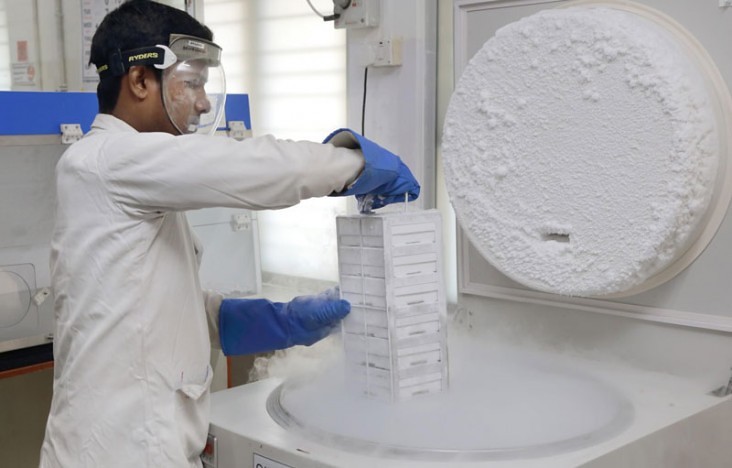- What We Do
- Agriculture and Food Security
- Democracy, Human Rights and Governance
- Economic Growth and Trade
- Education
- Environment and Global Climate Change
- Gender Equality and Women's Empowerment
- Global Health
- Humanitarian Assistance
- Transformation at USAID
- Water and Sanitation
- Working in Crises and Conflict
- U.S. Global Development Lab
Speeches Shim

Research transforms lives. It helps us understand complex problems and create solutions across cultures, regions, and sectors. Research-based tools and innovations improve the way we plan for and respond to disasters, design our health systems, build resilience, boost productivity in agriculture, and understand environmental changes.
USAID is committed to evidence-based decision making through its investments in research and development activities. By partnering with higher education institutions and increasing the use of scientific research, tools, and analysis, USAID is improving development outcomes.
Programs to advance research:
Research increases the commitment and capacity of our partner countries to plan, finance, and implement solutions based on informed decision-making. We partner with higher education institutions in the United States and in USAID partner countries, governments, civil society, and the private sector to build local research capacity and use an evidence-based approach to development work.
The Accelerating Local Potential (ALP) program builds the research and scientific capacity of higher education institutions in USAID partner countries to become global leaders in science education and research. Local government officials, policymakers, and other development actors can use these higher education institutions as sources of knowledge and innovation for development.
The Building Research and Innovation for Development, Generating Evidence, and Training (BRIDGE-Train) program uses partnerships between higher education institutions in the United States and USAID partner countries to develop research, innovation, and training centers. These centers generate knowledge to address local and national development priorities.
The Bringing Research to Impact for Development, Global Engagement, and Utilization (BRIDGE-U) program works with higher education institutions in USAID partner countries to promote the effective use of research; to strengthen the pipeline of local researchers, policymakers, and development practitioners skilled in facilitating research utilization; and to build a knowledge base for effectively using research evidence to create development impact.
The Research Technical Assistance Center (RTAC) is a global network of nearly 900 university-affiliated researchers and experts associated with over 300 organizations. These scholars provide USAID with short-term expertise and technical assistance across all sectors and geographic areas, which helps USAID make strategic choices and evidence-based programming decisions.
The Long-Term Assistance and Services for Research (LASER) is a global network of university researchers and development practitioners collaborating on practical solutions to critical development challenges. LASER translates data and findings into development impact and builds technical and research capacity in USAID partner countries.
The Science, Technology, Innovation, and Partnerships Annual Program Statement (STIP APS) is a program that allows higher education institutions across the globe to create evidence-based solutions in partnership with USAID. The STIP APS encourages higher education institutions to collaborate with local institutions including the private sector, government, and civil society organizations to build support for resolving significant local development challenges.
Fellowships:
Fellowship programs provide researchers, scientists, and engineers the opportunity to use their technical expertise to address critical challenges in development while gaining firsthand experience working at USAID. Fellows apply their diverse backgrounds and technical knowledge across USAID’s sectors to support new approaches to development.
Fellowship programs include:
- American Association for the Advancement of Science (AAAS) Science & Technology Policy Fellowship (AAAS Fellows)
- AAAS Overseas Fellowship (open to AAAS alumni only)
- Embassy Science Fellowship (open to staff at federal agencies only)
- Jefferson Science Fellowship
- Institute of Electrical and Electronics Engineers (IEEE)-USA Engineering & International Development Fellowship
Policy & Coordination:
The USAID U.S. Global Development Lab uses research and evidence-based practice to drive successful programming and development. We do this by providing trainings, publishing USAID-supported research results on public platforms, and supporting the use of research within the Agency and among development practitioners. The Lab leads the Agency’s coordination of research through the Research and Development Council. The following documents are tools to help ensure high-quality research is used for development and to increase the use of scientific research evidence:
Public Access Plan (launched in 2016)
Scientific Research Policy (launched in 2014)
Scientific Integrity Policy(launched in 2009)
Our legacy programs include:
The Higher Education Solutions Network (HESN) is a partnership between USAID and seven top universities to harness the ingenuity and passion of university students, researchers, and faculty to deliver solutions to global development challenges. Since its launch in 2012, HESN has created over 150 innovations and 160 research projects and has benefited nearly 20 million people in USAID partner countries. Read about HESN’s impacts here.
USAID has created eight Development Labs that incubate, catalyze, and scale new science and technology-based solutions.
- AidData at The College of William & Mary’s Center for Development Policy
- Development Impact Lab at The University of California, Berkeley
- Social Entrepreneurship Accelerator at Duke (SEAD) at Duke University
- ResilientAfrica Network at Makerere University in Uganda
- International Development Innovation Network (MIT IDIN) at Massachusetts Institute of Technology
- Comprehensive Initiative on Technology Evaluation (MIT CITE) at Massachusetts Institute of Technology
- Global Center for Food Systems Innovation (GCFSI) at Michigan State University
- Center on Conflict and Development (ConDev) at Texas A&M University
The Partnerships for Enhanced Engagement in Research (PEER) is a grants program that funds researchers, scientists, and engineers in USAID partner countries to conduct research in partnership with U.S. government-funded researchers on local development challenges. PEER helps to build capacity among local researchers and research institutions, strengthen research partnerships worldwide, and better translate data and evidence into policy. Since its launch in 2011, PEER has awarded nearly $100 million to over 350 projects in 50 countries.
CONCLUDED PROGRAMS
Research and Innovation Fellowships (2014 - 2018)
Seeding Labs (2014 - 2016)

Comment
Make a general inquiry or suggest an improvement.